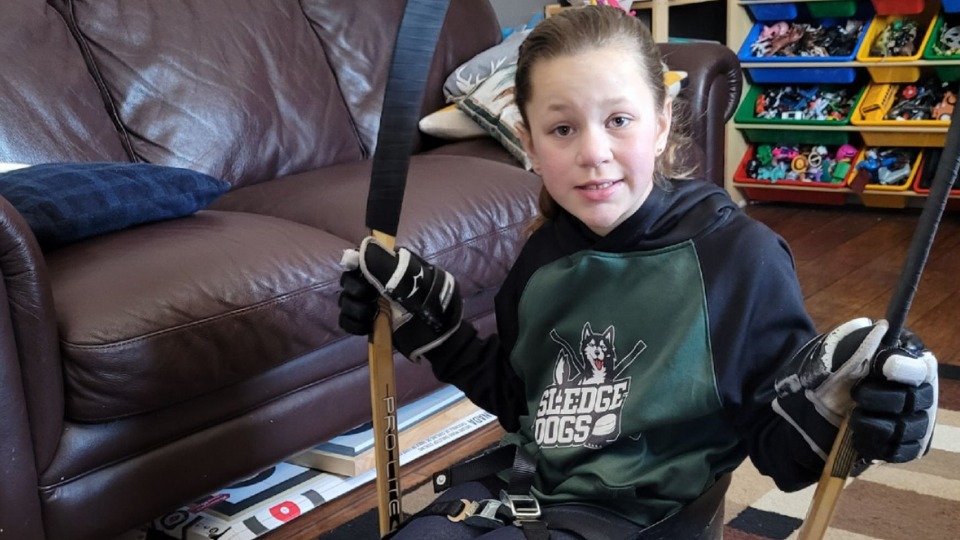With COVID-19 keeping players from the ice, Women’s Para Hockey of Canada turned a negative to a positive and took the game virtual
In the world of adaptive sport, Tara Chisholm says being able to make the
best out of any situation is essential. So, when COVID-19 forced Women’s
Para Hockey of Canada (WPHC) to alter plans for in-person grassroots para
hockey camps, Chisholm led a team to create Plan B – the Para Hockey at
Home Virtual Camp.
“That’s kind of the name of our game, is to adapt,†says Chisholm, head
coach of the national women’s para hockey team. “Just thinking of how we
can reach the most people, create the most impact and inspire girls and
women to stay motivated and keep pushing towards playing hockey.â€
Not a bad way to start the weekend. Thanks you to @CSHWT for providing this great opportunity. #HockeyIsHers #ParaIceHockey #HockeyIsForEveryone pic.twitter.com/4aNBtPAL3e
— Mr Hartman (@MrHartmangr8) February 6, 2021
Keeping players engaged in the game has been a key focus of the Hockey
Canada Foundation (HCF) throughout the pandemic, though levels of
engagement have been forced to change throughout the 2020-2021 season.
Women’s Para Hockey of Canada was initially awarded grant money from the
HCF for this season to be used to host in-person camps. When the idea for a
grassroots virtual camp was proposed as an alternative, the Foundation
greenlit the project.
“When we found out we were unable to do [in-person camps] due to COVID, we
were still fortunate enough to have the support of the Hockey Canada
Foundation to take that money and reinvest it into the community that we
were initially intending to serve but in a way that would work in [a] COVID
[world],†Chisholm says.
“The Foundation has given us the resources and it’s even bigger than that.
It’s support, just to say, ‘What you’re doing is great,’†adds Janice
Coulter, president of Women’s Para Hockey of Canada.
The Para Hockey at Home Virtual Camp was a three-day, six-session camp
conducted over Zoom in early February. While holding the camp virtually
wasn’t the original plan, the online format did allow for participation
regardless of where the athletes were geographically.
“And the other part was that people could participate at the level that
worked for them. So maybe if they were recovering from injury, they
couldn’t go full on in the workout, but that equipment session was totally
fantastic for them,†Coulter says.
The 55 grassroots participants, ranging in age from six to 63, received an
equipment kit with everything they would need to participate in the camp,
including a pair of sticks, a tool kit to maintain their sleds, a jersey, a
water bottle and a few other goodies. The sessions covered fitness, mental
preparation, stick-handling skills and para hockey equipment adjustments
and maintenance.
The weekend was led by the national women’s high-performance program,
including presentations from coaches and trainers as well as the athletes
themselves. Chisholm says having a chance to interact with the grassroots
participants was a big boost for her players, many of whom haven’t been on
the ice with their own club teams this year.
“With this they got that sense of community back for a weekend so that’s
been really positive,†Chisholm says.
But it really was the grassroots participants who benefited the most from
the involvement of the high-performance players.
“Other girls and women with a similar disability can learn right from
somebody who’s gone through what they went through. So, I think it’s always
extremely impactful when we can have our women with disabilities be the
leaders because they know it better than I ever will,†adds Chisholm.
Feedback following the camp from both grassroots participants and the
high-performance athletes was so encouraging, WPHC will continue to host
sessions for the group every six to eight weeks. There is even some
discussion into the possibility of hosting more virtual camps in the
future.
“That six-year-old with spina bifida, her friend that she met at the camp
who is also six years old and has spina bifida might live three provinces
over, and so they might never connect if we don’t continue to do virtual
camps,†Coulter says. “So, I think we’re recognizing this is really
important.â€
For more information on the Hockey Canada Foundation, please visit
HockeyCanada.ca/Foundation.



